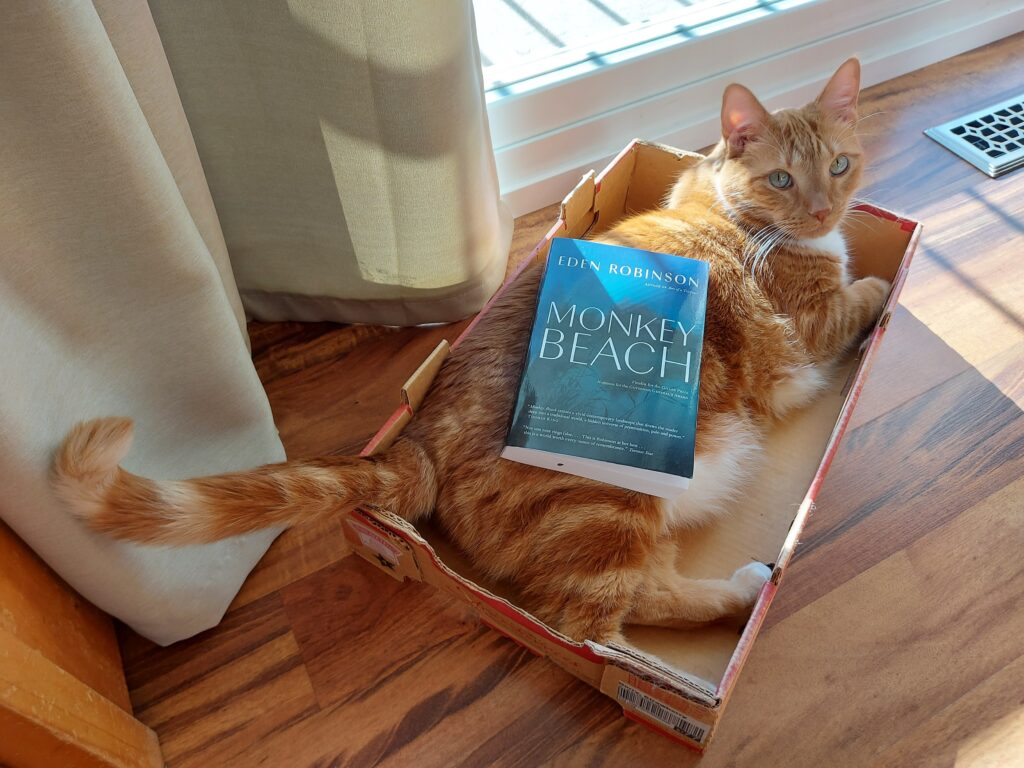Monkey Beach by Eden Robinson

Monkey Beach is the first novel by Indigenous writer Eden Robinson and was first published in 2000. It is set in Haisla territory on the British Columbia coast just north of Vancouver Island, where Robinson was born. Monkey Beach is an engrossing read, but the ending devastated me, and I actually woke up in the middle of the night thinking about it.
Monkey Beach is about Haisla teenager Lisamarie (Lisa) Hill and her family, who live in Kitamaat Village. The premise of the novel is quite simple: her younger, seventeen-year-old brother, Jimmy, has disappeared at sea while on a fishing trip, and Lisa decides to set off alone, in a boat, to find him and make a stop at the eerily mysterious Monkey Beach, a place that her family used to camp at when she and her brother were kids, and a place known for its sasquatch sightings. But Monkey Beach is also a reflection on Lisa’s life growing up as Haisla and the events in her childhood that have shaped her into the person that she is in the present (I should note that this novel is set in the 1970s and 80s).
Lisa’s childhood was not idyllic, but she grew up with the childhood naivety of not fully understanding the difficulties Indigenous people face in Canada or the racism directed towards her and her people. She casually mentions that her father, who was an accountant, quit his job after being passed over for promotion at work, but does not reflect on the reason why he was passed over for promotion probably had to do with his being Indigenous. She does not understand why her Aunt Trudy (her father’s older sister) is so angry with her Ma-ma-oo (grandmother), even when her cousin (Trudy’s daughter) explains to her it is because Ma-ma-oo sent Aunt Trudy and her Uncle Mick (her father’s older brother) to live at a residential school when they were children. Lisa does not realize the implications of this, that being sent to a residential school would be a contributing factor to Aunt Trudy being an alcoholic and Uncle Mick spending his life advocating for Indigenous rights, and both of their mental health problems.
There is a scene in the novel when Lisa’s cousin is being harassed by a group of white men and Lisa stands up to them, and these men are about to attack her before another white man steps in and scares them off. Lisa’s family is angry at her when they find out, and she thinks its unfair that they are angrier with her than with the white men that threatened her and cousin, even after her dad tries to explain to her that nobody would have helped her because she is Indigenous, and that she should have run away from them.
Lisa’s upbringing is one tragic event after another, with the deaths of close family members, being sexually assaulted by a friend, and eventually losing herself to drug and alcohol abuse. She feels guilty for the deaths of her family members because every time something bad happens, a little man with red “troll doll” hair visits her the night before, like a harbinger of death, or she has prescient dreams. She does not tell anyone about this, except her Ma-ma-oo, because she does not think anyone else will believe her. And she does not know how to deal with the visits from the little man or the dreams, except to try to ignore them.
Lisa can also sense the presence of spirits and ghosts, if not actually see them. I found Monkey Beach fascinating as it provides details about Haisla customs and beliefs, especially spiritual beliefs. Lisa’s Ma-ma-oo does see ghosts and is very casual about it, like seeing the spirits of dead family members is a normal, everyday occurrence. Monkey Beach is one such place where Lisa experiences spiritual encounters, so there is a reason why she goes there while searching for Jimmy.
The final revelation at the end of the novel about why Jimmy went on the fishing trip in the first place and what happened to him, and how Lisa finds out, is stunning and lingered with me for days after I finished reading Monkey Beach. I recommend this novel to readers who appreciate coming-of-age stories and family dramas, with a bit of spiritual encounters mixed in, just be prepared to be emotionally wrecked by it.
One thought on “Monkey Beach by Eden Robinson”